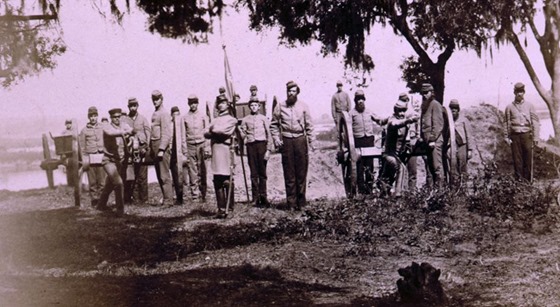May 8th. Lying to an anchor in the Mississippi off the mouth of Red river; all quiet on the “Father of Waters,” up to four A. M., when a scene of great excitement occurred on board of the Flag-ship Hartford. The reader may ask what was the cause of it? Was the enemy near? No; but our friends were, and about bidding us, maybe, a long adieu, and leaving the good old ship for other parts; and they were our best of friends,—those who had left their wives and children, homes, relations, all that tends to make home dear, to be with us, and by their presence, kind words, and noble example, encourage us to deeds of noble daring; and well, dear reader, have they performed this duty, as the preceding pages of this book will testify, having been under their command in nine general engagements with the enemy, and have come out of all victorious, with little loss of life or limb, and the least damage to ship, while other vessels of the fleet had to succumb to the destructiveness of the enemy’s shot and shell, losing many valuable lives. This will appear more wonderful when it is taken into consideration that we always took the lead; we never asked others to go where we were afraid to go ourselves, and by this course of proceeding the Hartford has earned herself and brave Commander a name and fame at home and abroad. The rebels upon the banks of the Mississippi call her the black devil, and honorably acknowledge him who flies his broad blue pennant in defiance to them from her masthead, to be a bold, brave, and daring old warrior. I think it is a well-deserved compliment to the old naval hero, who never knew what fear or defeat was, and also to the staunch and noble old vessel whose decks he has trod with such a courageous tread and quiet mien, while guiding her movements when engaged with the enemy at close quarters, and running the gauntlet of their terrible batteries under a storm of iron hail. Success to him and his brave companions in all their future operations is the wish of the writer of these few lines, and may he be spared many years yet to brighten the rage of history with an account of his glorious deeds in the service of his country. Although rumored the day previous, the ship’s company could not be made to believe that we were going to lose one who held such a place in the hearts of all, and had become so dear—whose name was a household one; but alas! the dawn of this day proved the rumor too true, and many a countenance of these tars, tried by fire and water, every one a hero and able to relate an account of his hair-breath escapes from the enemy, was darkened and clouded over from the effect of this sad news; others’ eyes were wet with the tears they would fain conceal, but could not; their grief would find vent through this channel. All things being in readiness, at four, forty this morning, precisely, the following officers left the ship, viz . Rear-Admiral D. G. Farragut, Fleet Captain T. A. Jenkins, Fleet Surgeon J. M. Foltz, Rear-Admiral’s Secretary, E. C. Gabaudan, Fleet Captain’s Clerk, E. A. Palmer; also Lieut. Eaton of U. S. A. Signal Corps, and two soldiers of same; at five A. M., the Sachem got under way with them on board, when the lads manned the rigging, and gave three times three with a will; such cheers were seldom given by our noble sailors to any person or persons, and the honored recipients of same will long remember the event.











